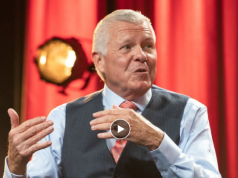Rules knowledge, mechanics and making the right calls are important. Missing any of those elements can break your career, but having them won’t make it.
Wait. What?
It’s true. They won’t set you apart. Because all officials should be studying the rules, getting in the right position to make the calls and making the right calls most of the time. Those skills are what bond most officials and make them the same.
To set yourself apart from other good officials you must have something else, something special. You need that It Factor. “It” is what assigners, supervisors and other officials are looking for from you.
At a recent NASO summit, four individuals who have proved they have “IT” in spades came together and tried to figure out just what “IT” is. Fox Sports analyst Mike Pereira, who previously directed the NFL officiating department and is a former NFL official, led a discussion on officiating with former MLB umpire Mike Reilly, NFL referee Gene Steratore and NBA referee Joe Crawford (now retired). On and off the field and court, those officiating icons combine for more than 100 years officiating experience.
A number of It Factors emerged from those professionals. Ask yourself if you have what it takes to reach the next level in your officiating or consistently maintain a high performance at the level you’re at.
Passion
Do you have a passion for officiating or is it just another means to a paycheck? Money is important, but passion pays off. It counts. If you’re hooked on officiating, your attitude on and off the field and court with your fellow officials shows that. You want to go to those weekly association meetings (even the long-winded ones). It never enters your mind not to stick around after the game to discuss things with your partners, because you want to get better.
For many officials, it starts with a passion for the game and develops into a passion for officiating. But for some, that passion for officiating was passed down right away.
“I got hooked on it because my dad was an official,” Pereira said. “So I started at a very young age trying to understand officiating. I learned the game through the eyes of an official.”
Crawford credits his dad, the late MLB umpire Shag Crawford, for helping him develop his passion for officiating as well.
“I was just a fortunate person,” Crawford said, “and I owe everything to that guy because it is what formed me as a referee — that passion, that love that he had for his profession.”
That makes sense to Reilly. Even though he didn’t grow up in an officiating family, he developed a passion for baseball as a player.
“My father was in business, but I have five brothers and we grew up with the love of baseball and the game itself,” Reilly said. “And once I got started and realized that I wasn’t going any further as a player, that desire to be the best official — the best umpire I could be — developed.”
That passion can carry you in officiating. You will be able to see that passion in your partners and it will grow in you as well. It’s not about getting to the highest level, according to Steratore, but rather soaking up the experience at any level.
“You learn how to officiate this game in a car in February driving on an icy road in basketball with a man who probably has been doing Division II or III basketball for 35 years because he loves it, not because he’s on TV,” Steratore said. “Not because he’s making a bunch of scratch or he’s got a nice 401K — he loves the game. He knows how to manage people.
“You’re a young kid in his car and you don’t even know who you are yet let alone interfacing with, when you progress to the college level, someone who is doing this for a living. So now you’re back to the purity of officiating and the purity of the passions. …
“Officiating in its purest sense is in that car while you pick his brain about the interface you had with that D-III coach in front of 100 people four hours away from your house. And what he said to you, how you responded back because you were young and stupid and weren’t polished enough — and he taught you about yourself indirectly. If you were really smart and paying attention, you were learning about yourself, which was a life-learning experience.”
Competition Instinct
A passion for officiating equals a passion for competition. A competitive instinct counts. It shows you want to improve. You want to be better than the veteran official working next to you. You watch the next level because you want to be good enough to reach that next level. You’re disappointed that you didn’t get that state assignment, but instead of moping, you use that “rejection” for motivation to work on your game.
“I loved the game and I love to compete,” Reilly said about baseball. “And I think as an umpire we go out every day and compete against the game to be the best. And when I say, ‘Compete against the game,’ you go out there to be perfect. And we all know as referees and umpires that’s impossible. But that’s our goal when we start that particular game — to be perfect.”
Crawford agrees.
“I want to work with those two people out there and we want to be perfect,” he said. “At the highest level we want to get this thing done, and we want to do it right.”
When you don’t do as well as you set out to do, you don’t let that bring you down. It happens to the best of the best. The key is to not let it knock you out for good. You need to get up and fight to prevent future mistakes.
“It can be consuming. It can eat you up,” Crawford said, “because this year I had a couple hiccups in a couple of the games, and you really start to question yourself a little bit, especially when you hit the old 62, and you start to say, ‘I don’t know. Joey may have a little problem here.’
“But you’ve got to fight it. You’ve just got to keep battling it, and you hope the powers that be have the confidence in you to keep putting you back there.”
Command
There are some officials who make you wonder if they will be able to handle a big game, and then there are other officials at various levels that you know will handle the game. Assigners want them on that big rivalry or championship game. Fellow officials want to work with them. Having that command counts.
“In the NFL, you’re watching a quarterback that just went through a real quick bang, bang hit,” Steratore said. “You’re not sure if it was a foul or not, it’s close as heck, and now all of a sudden there’s three whistles from 40 yards away and someone’s running to you with a foul, but you have no idea of what it was. Convey that confidence, do it the right way and annunciate it correctly.”
Show you’re in control, and people will believe you’re in control.
“I watch referees. That’s what I do,” Crawford said. “… I don’t know anything about the NFL. I grew up in baseball, but I don’t know anything about umpiring Major League Baseball. But I’ve watched (Steratore and Reilly). They have command. That’s what they have.
“(Steratore’s) command as a referee, (Reilly’s) command behind the plate is what sold these two guys. It’s what sold (retired NBA referee) Steve Javie. The command on the court or the field — how they’re being respected. Now if you call that ‘It,’ I don’t know. But all I know is that they got it because I’ve watched them.”
If you have command, you’re a decision-maker. You don’t wait and let your crewmembers bail you out on a close play. You step up and make the call every time.
“I used to tell officials, ‘You know what? When you’re going to throw (the flag), throw,’” Pereira said. “’Make the decision — if you’re right, (or) you’re wrong. If you’re wrong, who cares? You’ll learn. But when you do something on the field, be definitive.’”
If you are definitive, Pereira said, observers will recognize and appreciate that.
“You can teach him what you want called for holding,” Pereira explained. “You can teach him what you want let go — you can teach him that. But some stuff comes naturally — that instinct, that deportment, that comportment, that physical nature of being when you’re looking at somebody.”
People Skills
How do you interact with players, coaches and your fellow officials? Your personality counts. Crawford said that he learned that concept later in his career, but he believes that being a people person is important in officiating.
“What you really got to do in my opinion is take a step back,” Crawford said. “And (the late) Darell Garretson (former NBA director of officiating) used to say to me, ‘Joey, you’ve got to get a little more of your off-court personality and put it on the court because you turn — you laugh for 22 hours, and then for two hours it’s like somebody put Satan in you.’ And I used to say to him, ‘I didn’t understand that.’”
Crawford gets it now.
“That’s what I’ve come to realize — that you have to be a people person to referee,” he said. “I didn’t say, ‘Nice guy.’ I said, ‘A people person.’ And I think that’s what I didn’t get early on because I was listening to my father who was from the ’50s and the ’60s, and they attacked all the time. That’s how they officiated; it was attack.
“And that isn’t the way of the world today. … If I could do anything from the start again, I think I’d be a little more of a people person.”
Situation Management
Along with being a people person, you need to be able to handle situations that arise. You need to rise above pressure situations and not let them consume you.
“You wonder why some of these guys don’t make it,” Reilly said, “and it’s because … they just didn’t get it. They were good at ball, strike, safe and out — they could do it. But when it came to gametime handling of situations, handling managers, handling the pressure of the game, they couldn’t do it.”
Crawford shared a story about an NBA summer league game in Orlando in which Detroit was playing. Rasheed Wallace, who often led the league in technical fouls as a player, is an assistant coach for Detroit. Tiffany Bird was one of the officials on the game. One of the other referees was an NBA referee. For their first four years in the league, NBA officials work in the summer league.
“There’s a timeout between the third and the fourth period, and I see Rasheed reeling her in,” Crawford said. “So I’m watching and I’m saying to myself, this is why we’re here. We’re going to find out whether this referee has it. So I’m watching her and I’m just sitting there going, ‘Whack him, whack him.’
“Finally Rasheed is being real nice and then, bang, he went right for the jugular. And she just put her hand right up in his face and said, ‘I’ve got enough of you.’ That lady bought me. She now became — this doesn’t have anything to do with a guy or a woman — a referee.”
Handling arguments and other situations is essential in all sports.
“In baseball, the art of arguing is a quality you have to have,” Reilly said. “So when I look for a young umpire that we’re looking for that It Factor — it’s how someone handles himself in a stressful situation in an argument. And it could be different circumstances, one where he’s 100 percent right, and the other one is 100 percent wrong, and he knows it in both cases. But how aggressive is this young umpire who’s trying to find himself?
“And it doesn’t have to be a major league umpire. It could be a high school umpire, it can be a college umpire. But how, when you get in those sh– houses, you know how to get yourself out of them. And when you’re right, you’re right, and when you’re wrong you’ve got to be right. And that’s how you’ve got to handle those things.”
Investment
Officials know the commitment it takes to officiate, but for the most part, no one else cares. And that’s OK. You know you matter to the game.
When the NFL officials returned to work last season following the games worked by replacement officials, Steratore was the referee for the first game back.
“When we went back to officiate it wasn’t about us going back or ‘Look at us,’” Steratore said. “It was about that suddenly just for a moment in time the world understood that officiating was an integral part of sporting events. No more recognition.
“Yeah, did I tip my cap. Did I tip it twice? Yes. … I got more calls driving from Washington, Pa., to Baltimore that day from NBA officials, a couple major league umpires, college basketball officials, every official from every sport called … because they felt something as an official.
“We felt appreciated, which you don’t really strive for but it overwhelms you when it occurs, because without us guys and ladies the game doesn’t happen.”
While most officials will not be elevated by such an ovation in their careers, knowing that you are important, that your fellow officials are important and that your industry is important counts. It sets you apart.
So, what is the It Factor? It’s passion, humility, confidence, integrity, presence, respect for game, command, flexibility, dedication, trustworthiness, instinct, situation management, communication, pride, investment, people skills and competition instinct.
Does that match your list? It is all of the above.
“Every one of those, each word, is what you have to do to be successful, if you think about it,” Crawford said. “Passion, desire, respect … those are the qualities you need as an official at any level.”
“It is all about how you handle yourself,” Pereira agreed. “From my standpoint … that’s what makes an official.”
You can count on it.
What's Your Call? Leave a Comment:
Note: This article is archival in nature. Rules, interpretations, mechanics, philosophies and other information may or may not be correct for the current year.
This article is the copyright of ©Referee Enterprises, Inc., and may not be republished in whole or in part online, in print or in any capacity without expressed written permission from Referee. The article is made available for educational use by individuals.



















